英语手抄报之:狗肉节“不合法”
- 格式:docx
- 大小:37.73 KB
- 文档页数:2
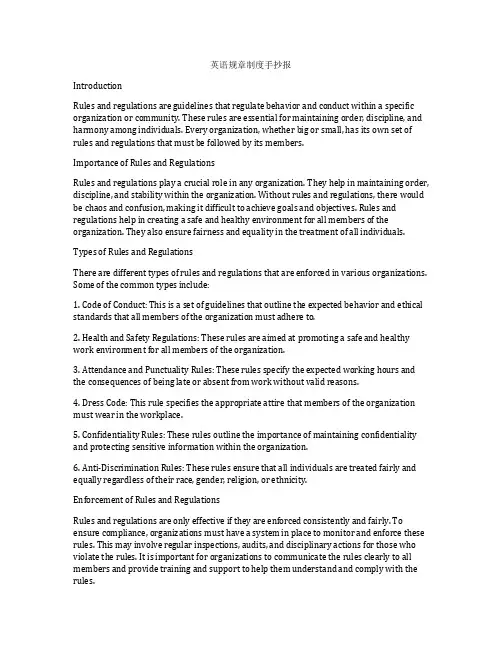
英语规章制度手抄报IntroductionRules and regulations are guidelines that regulate behavior and conduct within a specific organization or community. These rules are essential for maintaining order, discipline, and harmony among individuals. Every organization, whether big or small, has its own set of rules and regulations that must be followed by its members.Importance of Rules and RegulationsRules and regulations play a crucial role in any organization. They help in maintaining order, discipline, and stability within the organization. Without rules and regulations, there would be chaos and confusion, making it difficult to achieve goals and objectives. Rules and regulations help in creating a safe and healthy environment for all members of the organization. They also ensure fairness and equality in the treatment of all individuals.Types of Rules and RegulationsThere are different types of rules and regulations that are enforced in various organizations. Some of the common types include:1. Code of Conduct: This is a set of guidelines that outline the expected behavior and ethical standards that all members of the organization must adhere to.2. Health and Safety Regulations: These rules are aimed at promoting a safe and healthy work environment for all members of the organization.3. Attendance and Punctuality Rules: These rules specify the expected working hours and the consequences of being late or absent from work without valid reasons.4. Dress Code: This rule specifies the appropriate attire that members of the organization must wear in the workplace.5. Confidentiality Rules: These rules outline the importance of maintaining confidentiality and protecting sensitive information within the organization.6. Anti-Discrimination Rules: These rules ensure that all individuals are treated fairly and equally regardless of their race, gender, religion, or ethnicity.Enforcement of Rules and RegulationsRules and regulations are only effective if they are enforced consistently and fairly. To ensure compliance, organizations must have a system in place to monitor and enforce these rules. This may involve regular inspections, audits, and disciplinary actions for those who violate the rules. It is important for organizations to communicate the rules clearly to all members and provide training and support to help them understand and comply with the rules.Consequences of Breaking RulesBreaking rules and regulations can have serious consequences for individuals within an organization. Depending on the severity of the violation, penalties may range from verbal warnings to termination of employment. It is important for individuals to understand the repercussions of breaking the rules and to take responsibility for their actions.ConclusionRules and regulations are an essential part of any organization. They help in maintaining order, discipline, and stability within the organization. By following the rules, individuals can contribute to the overall success and growth of the organization. It is important for organizations to ensure that their rules and regulations are clear, fair, and enforced consistently. By doing so, they can create a positive and productive work environment for all members.。
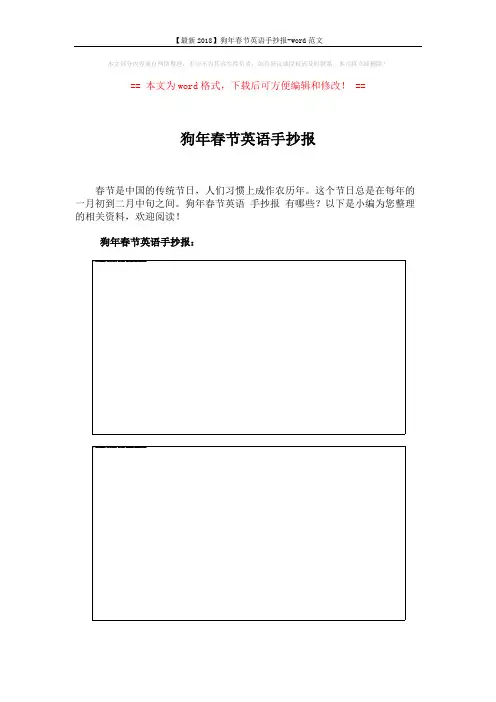
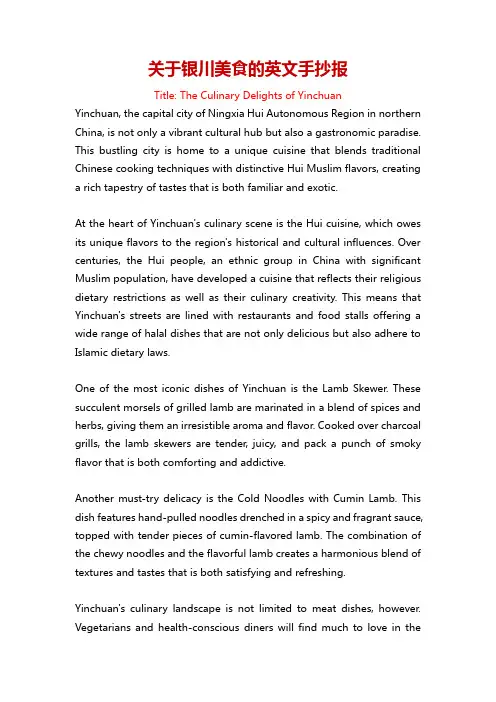
关于银川美食的英文手抄报Title: The Culinary Delights of YinchuanYinchuan, the capital city of Ningxia Hui Autonomous Region in northern China, is not only a vibrant cultural hub but also a gastronomic paradise. This bustling city is home to a unique cuisine that blends traditional Chinese cooking techniques with distinctive Hui Muslim flavors, creating a rich tapestry of tastes that is both familiar and exotic.At the heart of Yinchuan's culinary scene is the Hui cuisine, which owes its unique flavors to the region's historical and cultural influences. Over centuries, the Hui people, an ethnic group in China with significant Muslim population, have developed a cuisine that reflects their religious dietary restrictions as well as their culinary creativity. This means that Yinchuan's streets are lined with restaurants and food stalls offering a wide range of halal dishes that are not only delicious but also adhere to Islamic dietary laws.One of the most iconic dishes of Yinchuan is the Lamb Skewer. These succulent morsels of grilled lamb are marinated in a blend of spices and herbs, giving them an irresistible aroma and flavor. Cooked over charcoal grills, the lamb skewers are tender, juicy, and pack a punch of smoky flavor that is both comforting and addictive.Another must-try delicacy is the Cold Noodles with Cumin Lamb. This dish features hand-pulled noodles drenched in a spicy and fragrant sauce, topped with tender pieces of cumin-flavored lamb. The combination of the chewy noodles and the flavorful lamb creates a harmonious blend of textures and tastes that is both satisfying and refreshing.Yinchuan's culinary landscape is not limited to meat dishes, however. Vegetarians and health-conscious diners will find much to love in thecity's vegetable-forward dishes. A standout among these is the Stir-Fried Green Beans with Dried Chili Peppers. This dish showcases the natural sweetness of green beans, amplified by the fiery heat of dried chili peppers and a sprinkle of garlic. It's a simple yet flavorful dish that packs a punch of heat and aroma.For dessert, Yinchuan offers a range of sweet treats that are as visually appealing as they are delicious. One such treat is the Ningxia Red Dates, which are prized for their plumpness, sweetness, and nutritional value. These dates are often eaten as snacks or used in desserts like Red Date Cake, a moist and fragrant cake that is beloved by locals and visitors alike.Exploring Yinchuan's food scene is an adventure for the senses. From the sizzling grills of the lamb skewers to the fragrant steam rising from bowls of noodle soup, every corner of this city offers a tantalizing taste of the region's rich culinary heritage. Whether you're a foodie on a quest for new flavors or a traveler looking to immerse yourself in the local culture, Yinchuan's diverse and delicious cuisine is sure to leave a lasting impression on your taste buds.。
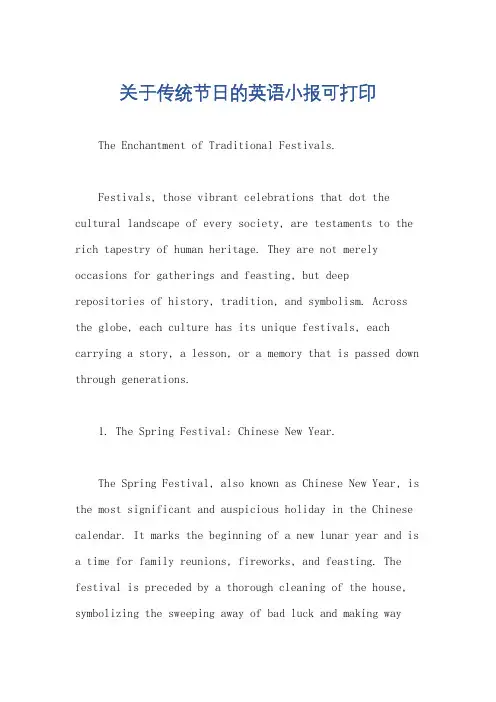
关于传统节日的英语小报可打印The Enchantment of Traditional Festivals.Festivals, those vibrant celebrations that dot the cultural landscape of every society, are testaments to the rich tapestry of human heritage. They are not merely occasions for gatherings and feasting, but deeprepositories of history, tradition, and symbolism. Across the globe, each culture has its unique festivals, each carrying a story, a lesson, or a memory that is passed down through generations.1. The Spring Festival: Chinese New Year.The Spring Festival, also known as Chinese New Year, is the most significant and auspicious holiday in the Chinese calendar. It marks the beginning of a new lunar year and is a time for family reunions, fireworks, and feasting. The festival is preceded by a thorough cleaning of the house, symbolizing the sweeping away of bad luck and making wayfor good fortune. Red, the color of luck and prosperity, adorns every household, from door couplets to lanterns. Family members, regardless of where they are, strive to be home for this festive occasion, making it a truly momentous reunion.2. Diwali: The Festival of Lights.Diwali, the Festival of Lights, is a vibrant Hindu festival that celebrates the victory of good over evil, symbolized by the lighting of lamps and candles. It is also a time for family gatherings, feasting, and the exchange of gifts. The festival is marked by the lighting of "diyas" (earthen lamps) and fireworks, creating a magical atmosphere. Homes are decorated with rangoli (colorful patterns) and flowers, and families sit together to enjoy a feast of sweet and savory dishes.3. Eid: The Festival of Sacrifice.Eid, observed by Muslims worldwide, marks the end of the fasting month of Ramadan. It is a time for joy,feasting, and giving, with families coming together tooffer prayers and exchange greetings. The festival is associated with the story of Prophet Ibrahim's willingness to sacrifice his son, Ishmael, at God's command. Eid is celebrated with feasting, the exchange of gifts, and visits to relatives and friends.4. Christmas: The Festival of Joy.Christmas, celebrated on December 25th, is the most significant holiday in the Christian calendar. It commemorates the birth of Jesus Christ and is marked by a festive atmosphere of joy, giving, and feasting. Homes are adorned with Christmas trees, lights, and ornaments, creating a cozy and warm atmosphere. The exchange of gifts, particularly on Christmas Eve, is a central tradition. The festive meal, known as Christmas dinner, usually consists of turkey, ham, and other traditional dishes.5. Halloween: The Festival of the Dead.Halloween, observed on October 31st, is a festivalassociated with the ancient Celtic festival of Samhain. Itis a time for costuming, trick-or-treating, and the celebration of the afterlife. Children dress up in costumes and go "trick-or-treating," visiting neighbors' houses to receive treats. The festival is also marked by bonfires, carvings of pumpkins into jack-o'-lanterns, and rituals designed to protect against evil spirits.In conclusion, traditional festivals are not just about feasting and gatherings; they are repositories of culture, history, and tradition. They bring families together, promote unity, and instill values in the younger generation. These festivals, whether they are celebrated in China, India, the Middle East, or Europe, are a testament to the diversity and richness of human culture.。
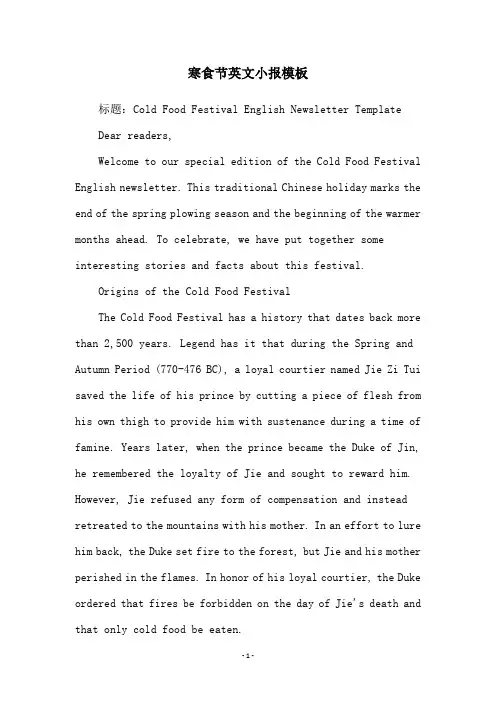
寒食节英文小报模板标题:Cold Food Festival English Newsletter TemplateDear readers,Welcome to our special edition of the Cold Food Festival English newsletter. This traditional Chinese holiday marks the end of the spring plowing season and the beginning of the warmer months ahead. To celebrate, we have put together some interesting stories and facts about this festival.Origins of the Cold Food FestivalThe Cold Food Festival has a history that dates back more than 2,500 years. Legend has it that during the Spring and Autumn Period (770-476 BC), a loyal courtier named Jie Zi Tui saved the life of his prince by cutting a piece of flesh from his own thigh to provide him with sustenance during a time of famine. Years later, when the prince became the Duke of Jin, he remembered the loyalty of Jie and sought to reward him. However, Jie refused any form of compensation and instead retreated to the mountains with his mother. In an effort to lure him back, the Duke set fire to the forest, but Jie and his mother perished in the flames. In honor of his loyal courtier, the Duke ordered that fires be forbidden on the day of Jie's death and that only cold food be eaten.Traditions of the Cold Food FestivalThe Cold Food Festival is observed on the third day of the third lunar month in China. It is a time for people to pay their respects to their ancestors, visit family and friends, and enjoy traditional foods such as cold noodles, qingtuan (green rice cake), and mianwo (flour cake). Some people also participate in dragon boat races, kite flying, and other outdoor activities.One unique tradition of the Cold Food Festival is the practice of 'ascending the heights.' This involves climbing a mountain or hill to admire the scenery and take in the fresh air. It is believed that this activity can bring good health and good luck for the coming year.ConclusionThe Cold Food Festival is an important part of Chinese culture and history. It is a time to reflect on the sacrifices of those who came before us, to celebrate the changing seasons, and to enjoy the company of loved ones. We hope that this edition of our newsletter has provided you with some valuable insights into this festival and its traditions.Best regards,[Your Name]。
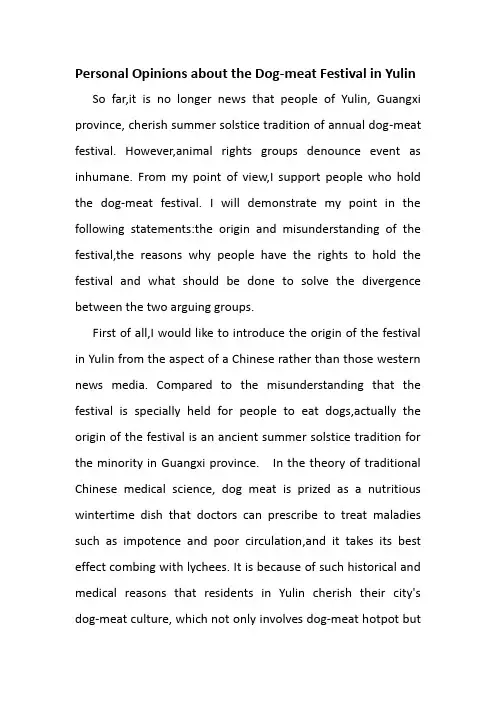
Personal Opinions about the Dog-meat Festival in Yulin So far,it is no longer news that people of Yulin, Guangxi province, cherish summer solstice tradition of annual dog-meat festival. However,animal rights groups denounce event as inhumane. From my point of view,I support people who hold the dog-meat festival. I will demonstrate my point in the following statements:the origin and misunderstanding of the festival,the reasons why people have the rights to hold the festival and what should be done to solve the divergence between the two arguing groups.First of all,I would like to introduce the origin of the festival in Yulin from the aspect of a Chinese rather than those western news media. Compared to the misunderstanding that the festival is specially held for people to eat dogs,actually the origin of the festival is an ancient summer solstice tradition for the minority in Guangxi province. In the theory of traditional Chinese medical science, dog meat is prized as a nutritious wintertime dish that doctors can prescribe to treat maladies such as impotence and poor circulation,and it takes its best effect combing with lychees. It is because of such historical and medical reasons that residents in Yulin cherish their city's dog-meat culture, which not only involves dog-meat hotpot butalso lychees and strong grain liquor. Besides,the dogs to be eaten in this festival are typically dogs bred for meat,but not the pet dogs that most western news media have always claimed about.Second,it is turn to discuss about why people have the rights to hold such a festival. The question that whether people have the rights to eat dogs has intensified for years,and this year the opponents hold the opinion that canceling the festival is the future trend of civilization. It is interesting to probe the definition of civilization. Since the core values of the modern civilization are freedom,independence and equality,how to define the boundary of freedom?It comes to laws. According to laws in China,there is no regulation that prohibits people from eating dogs. In other words,it is Chinese’s rights to eat dogs and nobody has any legal reason to frustrate them. Besides, tracing back the concept of civilization,we will find out that its aim is to seek ways for human beings to gain well-being. In the words of Chinese characteristics,civilization is a part of Science Development Concept,guiding humans to lead a sustainable and harmonious life on the earth. In terms of eating habits,the way of getting food must not harm others’interests or the balance of the environment. Humans basically enjoy the givenrights from nature,and as a result of this deduction,residents’taking dogs as meat are reasonable.Last but not least,canceling the festival is not the proper way to solve the problem. The key point of the argument is not whether to eat or not,but to establish regulations for breeding and quarantine immediately. Only in this way,can not only comfort pet keepers who care for their pets,but also relieve people who worry about food safety.In conclusion,I hold the belief that people in Yulin totally have legal rights to hold the festival. It is absolutely none of pet keepers and opponents’business and they definitely have no legal rights to cancel the festival. Before respecting dogs, everyone should learn how to respect laws first.。
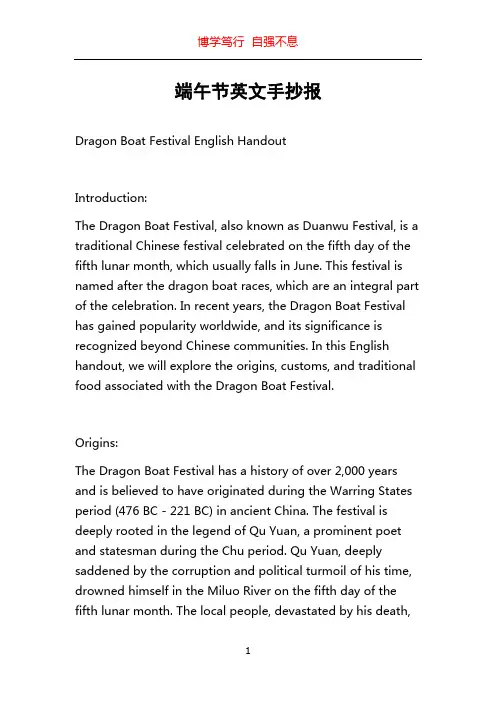
端午节英文手抄报Dragon Boat Festival English HandoutIntroduction:The Dragon Boat Festival, also known as Duanwu Festival, is a traditional Chinese festival celebrated on the fifth day of the fifth lunar month, which usually falls in June. This festival is named after the dragon boat races, which are an integral part of the celebration. In recent years, the Dragon Boat Festival has gained popularity worldwide, and its significance is recognized beyond Chinese communities. In this English handout, we will explore the origins, customs, and traditional food associated with the Dragon Boat Festival.Origins:The Dragon Boat Festival has a history of over 2,000 years and is believed to have originated during the Warring States period (476 BC - 221 BC) in ancient China. The festival is deeply rooted in the legend of Qu Yuan, a prominent poet and statesman during the Chu period. Qu Yuan, deeply saddened by the corruption and political turmoil of his time, drowned himself in the Miluo River on the fifth day of the fifth lunar month. The local people, devastated by his death,raced their boats and threw rice dumplings into the water to prevent fish from eating his body.Customs:The Dragon Boat Festival is marked by several customs, including dragon boat races, eating zongzi, hanging up colorful silk threads, and wearing colorful silk threads. Dragon boat races are the most thrilling and popular activity during the festival. Teams of rowers, typically consisting of 22 people, paddle their boats to the beat of drums, striving to be the first to reach the finish line. The races are not only a competition but also a way to pay homage to Qu Yuan's memory.Zongzi, a traditional sticky rice dumpling wrapped in bamboo leaves, is a must-have food during the Dragon Boat Festival. It symbolizes the rice balls that were thrown into the river to feed the fish and prevent them from devouring Qu Yuan's body. Zongzi can be filled with various ingredients such as meat, beans, and nuts, adding a delicious flavor to the festival celebrations.In addition to dragon boat races and zongzi, people also hang up colorful silk threads and wear them as accessories during the Dragon Boat Festival. These threads are believedto ward off evil spirits and bring good luck and protection to the wearer. The threads come in different colors, each representing a different meaning. Red is for good fortune, yellow for health, green for safety, blue for peace, and white for purity.Traditional Food:Apart from zongzi, there are other traditional foods associated with the Dragon Boat Festival. One such food is realgar wine, a yellow-orange alcoholic drink made by soaking realgar, a type of arsenic sulfide, in rice wine. It is believed that realgar wine has detoxifying properties and can ward off evil spirits.Another popular food during the festival is Five-Colored Sticky Rice, also known as Wufangzhai. This dish is made by steaming glutinous rice with natural food dyes, resulting in five different colors - red, yellow, green, white, and black. It is not only visually appealing but also delicious, symbolizing good luck and happiness.Conclusion:The Dragon Boat Festival is a significant cultural event in China, and its celebration is spreading worldwide. From dragon boat races to zongzi and traditional customs, thisfestival holds a special place in the hearts of people who appreciate and embrace Chinese culture. By learning about the origins, customs, and traditional food associated with the Dragon Boat Festival, we can enhance our understanding of this unique celebration that unites communities and promotes cultural diversity.。

关于传统节日的手抄报英文版Traditional FestivalsTraditional festivals have always held significant cultural importance in various societies around the world. These festivals are marked by a combination of religious, historical, and cultural festivities that have been passed down from generation to generation. They serve as a means of showcasing a nation's heritage and customs, as well as fostering a sense of unity and togetherness among communities. This article will explore some of the most well-known traditional festivals from different parts of the world.Chinese New Year is one of the most celebrated traditional festivals globally, observed by over a billion people worldwide. It is based on the lunar calendar and marks the beginning of the Chinese zodiac year. The festival typically lasts for 15 days and is filled with vibrant activities such as lion dances, dragon parades, and the lighting of firecrackers. It is a time for families to come together, exchange gifts, and enjoy delicious feasts. The festival is also associated with various customs such as wearing red clothes to bring luck and cleaning the house to sweep away bad luck from the previous year.Diwali, also known as the Festival of Lights, is a significant traditional festival in India celebrated by Hindus, Sikhs, and Jains. It symbolizes the victory of light over darkness and good over evil. Diwali typically lasts for five days and is characterized by the lighting of oil lamps, known as diyas, and the bursting of fireworks. People decorate their homes with colorful rangoli patterns,exchange sweets and gifts, and perform prayers to honor deities. The festival also marks the start of the Hindu New Year and is regarded as a time for families to come together and celebrate.St. Patrick's Day is an iconic traditional festival celebrated in Ireland and by Irish communities worldwide. It commemorates the patron saint of Ireland, St. Patrick. The festival is marked by parades, wearing green attire, and the display of shamrocks, which are said to be lucky. People gather to celebrate Irish culture through music, dance, and traditional Irish foods and beverages, including corned beef and Guinness. The festival has gained widespread popularity, with many cities around the world hosting their own St. Patrick's Day parades and events.Hanami, meaning "flower viewing" in Japanese, is an ancient traditional festival celebrated during the cherry blossom season. People gather in parks or gardens to admire the blooming cherry trees, known as sakura. Hanami is a time for picnicking, enjoying traditional Japanese performances, and appreciating the beauty of nature. It is a symbol of the transient nature of life and the renewal that comes with spring. The festival is often accompanied by traditional Japanese music, including the playing of the shamisen, and the wearing of traditional clothing, such as kimonos.In conclusion, traditional festivals play a vital role in preserving cultural heritage and promoting a sense of community. Whether it is the Chinese New Year, Diwali, St. Patrick's Day, or Hanami, these festivals bring people together to celebrate customs, traditions, and values that have withstood the test of time. Despite their cultural differences, these festivals share a common purposeof fostering unity and celebrating the richness of diversity. As we move forward in an ever-changing world, it is essential to honor and appreciate these traditional festivals that form an integral part of our collective human history.。
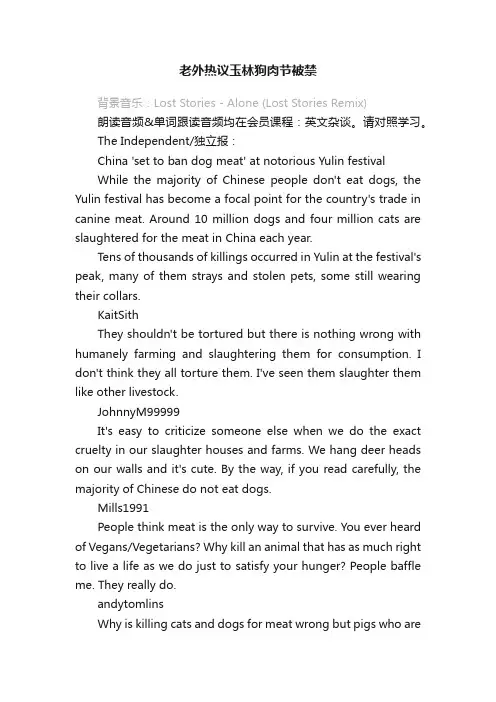
老外热议玉林狗肉节被禁背景音乐:Lost Stories - Alone (Lost Stories Remix)朗读音频&单词跟读音频均在会员课程:英文杂谈。
请对照学习。
The Independent/独立报:China 'set to ban dog meat' at notorious Yulin festivalWhile the majority of Chinese people don't eat dogs, the Yulin festival has become a focal point for the country's trade in canine meat. Around 10 million dogs and four million cats are slaughtered for the meat in China each year.Tens of thousands of killings occurred in Yulin at the festival's peak, many of them strays and stolen pets, some still wearing their collars.KaitSithThey shouldn't be tortured but there is nothing wrong with humanely farming and slaughtering them for consumption. I don't think they all torture them. I've seen them slaughter them like other livestock.JohnnyM99999It's easy to criticize someone else when we do the exact cruelty in our slaughter houses and farms. We hang deer heads on our walls and it's cute. By the way, if you read carefully, the majority of Chinese do not eat dogs.Mills1991People think meat is the only way to survive. You ever heard of Vegans/Vegetarians? Why kill an animal that has as much right to live a life as we do just to satisfy your hunger? People baffle me. They really do.andytomlinsWhy is killing cats and dogs for meat wrong but pigs who aremore intelligent fine?Ian GraceThere are those who abstain from eating any sentient beings and protest for their rights; there are viable alternatives to eating the flesh of once sentient beings.set to do something开始认真做某事ban 禁止notorious 臭名昭著的focal point 焦点;关注点canine 犬;犬科的slaughter 屠宰stray 走丢的动物collar 项圈humane 人道的farm 养殖;养殖场livestock 家畜cruelty 残忍;残忍的行为slaughter house 屠宰场vegan 绝对素食主义者vegetarian 素食主义者baffle 使…困惑abstain from doing something 戒除做某事sentient 有感知能力的viable 可行的。
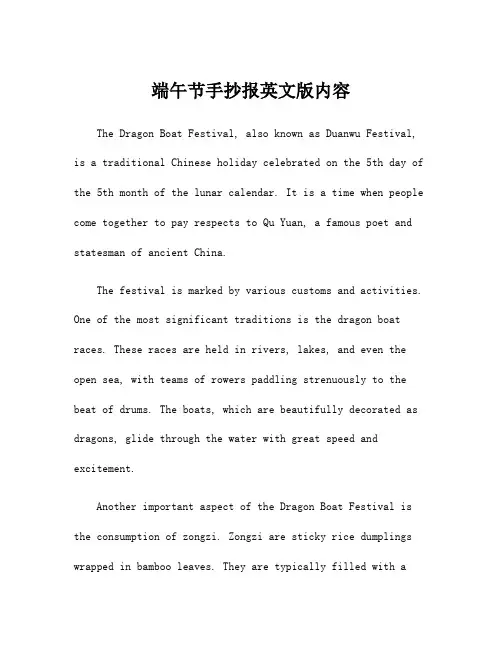
端午节手抄报英文版内容The Dragon Boat Festival, also known as Duanwu Festival, is a traditional Chinese holiday celebrated on the 5th day of the 5th month of the lunar calendar. It is a time when people come together to pay respects to Qu Yuan, a famous poet and statesman of ancient China.The festival is marked by various customs and activities. One of the most significant traditions is the dragon boat races. These races are held in rivers, lakes, and even the open sea, with teams of rowers paddling strenuously to the beat of drums. The boats, which are beautifully decorated as dragons, glide through the water with great speed and excitement.Another important aspect of the Dragon Boat Festival is the consumption of zongzi. Zongzi are sticky rice dumplings wrapped in bamboo leaves. They are typically filled with avariety of ingredients such as pork, beans, and nuts, andthen steamed or boiled. People believe that eating zongzi during the festival can ward off evil spirits and bring good luck and protection.During this festival, many people also hang up pouches containing herbs and spices, such as garlic and mugwort, on their doors to repel evil spirits. It is believed that these herbs have the power to ward off diseases and bring good health.In recent years, the Dragon Boat Festival has gained international recognition and has been celebrated in manyparts of the world. It has become a popular event wherepeople of different cultures come together to enjoy the races, experience Chinese culture, and savor the traditional delicacies.The Dragon Boat Festival is not just a time for fun and games; it is a time for people to connect with their culturalroots and appreciate the rich traditions of their ancestors. It serves as a reminder of the importance of unity, bravery, and resilience in the face of adversity.In conclusion, the Dragon Boat Festival is a vibrant and lively celebration that showcases the best of Chinese culture and heritage. It brings people together through exciting races, delicious food, and meaningful customs. This festival truly embodies the spirit of unity and determination, making it an unforgettable experience for everyone involved.。
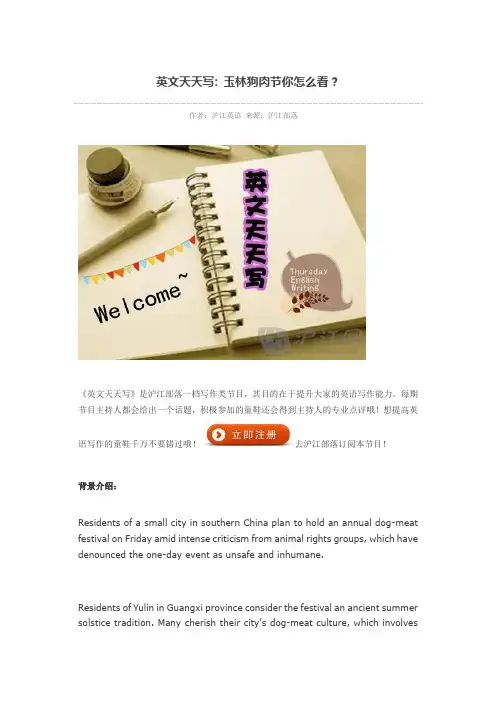
英文天天写: 玉林狗肉节你怎么看?作者:沪江英语来源:沪江部落《英文天天写》是沪江部落一档写作类节目,其目的在于提升大家的英语写作能力。
每期节目主持人都会给出一个话题,积极参加的童鞋还会得到主持人的专业点评哦!想提高英语写作的童鞋千万不要错过哦!去沪江部落订阅本节目!背景介绍:Residents of a small city in southern China plan to hold an annual dog-meat festival on Friday amid intense criticism from animal rights groups, which have denounced the one-day event as unsafe and inhumane.Residents of Yulin in Guangxi province consider the festival an ancient summer solstice tradition. Many cherish their city's dog-meat culture, which involvesthe mass consumption of dog-meat hotpot served with lychees and strong grain liquor.Animal rights groups say 10,000 dogs are slaughtered during the festival each year, and that many are electrocuted, burned and skinned alive. Pictures posted online show flayed dogs, dogs hanging from meat hooks, and piles of dog corpses on the side of the road. In China dog meat isprized as a nutritious winter time dish that doctors can prescribe to treat maladies such as impotence and poor circulation.Activists have tried to block the event on numerous occasions through open letters and street protests. Some have implored the UK and US governments to interfere with the festival via online petitions. "Please help us stop the Yulin Festival of eating dogs in Guangxi province. It is bloody and disregards life,"a petition on the US White House website was titled.话题:What's your opinion about this dog-meat festival?So should we ban dog meat festival?范例1:As we known, dogs are people's best friends. However, in Guangxi Yulin, there is a traditional festival called "dog-meat festival". On that day, people in Yulin eat dog meat to celebrate this festival. So should we ban dog meat festival?As for me, if the Chinesewere still practicing survival skills and ate everything within their grasp for lack of a steady supply of healthy food I could understand their need to eat dog meat, but in this case it is like throwing pearls to theswine as the Yulin festival of dog meat is not about starving poor eating strays; it is gourmands demanding dog meat to satisfy their medicinal needs, aphrodisiacal wishes and to please their taste buds.It is a matter of choice for people of different country. Korean also eat dog meat. They used to hang them up with hooks in stalls and the choice is yours to chose. In my country, dogs are not eaten. So they multiply and roam around as strays. They rummage dustbins for food. Some has sickness due to lack of human care. They live around the streets and no one to care for them. Dog catchers comes around once in a while to round them up. They will be taken to the centre where will be terminated by injections. All these are not shown to the public.All in all, I think dog meat festival should be banned.范例2:People become quite illogical when they try to decide what can be eaten and what cannot be eaten. Chinese are never bothered with such trifles as everything in their eyes can surely be eaten.There is a saying that Chinese eat everything with four legs, except tables, and everything that flies — except airplanes. It seems that all living creatures in the world can barely escape from Chinese’s chopsticks. Sea horse, rhino’s horn and tiger’s penis are considered to be precious medicines. Bear’s paw and money’s brain are served as some kind of delicacies. Slaughtering legions of dogs is merely a piece of cake. I guess it is hard to convince those people why pigs are eatable while dogs and cats are not. If there were a shortage of food, human flesh would also be one of their options.。
停下,玉林狗肉节英文作文停下,玉林狗肉节英文作文Residents of a small city in southern China plan to hold an annual dog-meat festival on Friday amid intense criticism from animal rights groups, which have denounced the one-day event as unsafe and inhumane.In China, dog meat is prized as a nutritious wintertime dish.But according to an open letter by the Hong Kong-based NGO Animals Asia, many of the dogs consumed during the festival are strays and abductees. Some are transported to the city on filthy, overcrowded trucks, significantly increasing the risk that they carry rabies and other contagious diseases. Yulin officials claim that the dogs are raised by local farmers.Chinese volunteers rescue dogs destined for dog-meat restaurants.They are trying to stop the dog eating festival.翻译:玉林是位于中国南部的小城市,本周五,这里的人们计划举行一年一度的狗肉节,但受到各方动物权益组织的强烈谴责,称这为期一天的'狗肉节既不安全也不人道。
七年级上册第九单元国际食品节英语小报 **International Food Festival: Tasting the World, Sharing Cultures**In the global village we live in today, it's more important than ever to appreciate and understand the rich diversity of cultures from around the world. The International Food Festival, held annually in our school, is a vibrant celebration of this diversity, where students and teachers alike come together to enjoy a diverse array of cuisines from different corners of the globe.The festival begins with a vibrant parade, led by our school band, through the main hallways of the school. Flags from various countries flutter in the air, symbolizing the unity in diversity that is the essence of the event. Theair fills with the aroma of various cuisines, each booth presenting a unique taste and cultural experience.From the spicy curries of India to the rich pastas of Italy, from the fresh sushi of Japan to the mouth-watering barbecues of Argentina, the festival truly is a feast for the senses. Each booth is decorated with traditional colorsand symbols, providing a visual treat as well as a taste of the world's flavors.Not just about food, the festival also featurescultural performances by students, ranging from traditional dances to folk music. These performances not only entertain but also educate, providing a window into the rich tapestry of global cultures.The highlight of the festival is the cooking competition, where students from different backgrounds team up to create dishes that combine their respective cultures. This competition not only showcases the culinary skills of the students but also promotes understanding and respectfor diverse food traditions.The International Food Festival is not just a day of feasting and fun, but also a powerful tool for cultural exchange and understanding. It reminds us that food is not just nourishment for the body, but also a medium for connecting people and cultures across the globe.By participating in this festival, we learn to appreciate the unique flavors and traditions of other cultures, while also sharing our own. In doing so, wecreate a more inclusive and understanding school community, where diversity is celebrated and everyone feels valued.The International Food Festival is truly a celebration of taste, culture, and unity. As we savor the flavors of the world, we also deepen our understanding and respect for the diverse cultures that make our global village such a rich and vibrant place.**国际食品节:品味世界,共享文化**在当今这个地球村里,欣赏和理解世界各地丰富多彩的文化比以往任何时候都更加重要。
端午节英语手抄报素材一等奖复杂IntroductionThe Dragon Boat Festival, also known as Duanwu Festival, is a traditional Chinese holiday that is celebrated on the fifth day of the fifth month of the Chinese lunar calendar. It is a time to commemorate the patriotic poet Qu Yuan and to ward off evil spirits. While this festival has deep cultural significance in China, it is not widely known in English-speaking countries. In this English language handout material for a first prize-winning complex composition, we will explore the history, customs, and traditions of the Dragon Boat Festival.HistoryThe Dragon Boat Festival has a long history that dates back over 2,000 years. It originated during the Warring States period in ancient China and has been passed down through generations. The festival is closely associated with Qu Yuan, a poet and minister who lived during the Chu State. Qu Yuan was exiled by the king due to court intrigue and corruption, and he eventually committed suicide by drowning himself in the Miluo River. The people who admired him raced to the river in boats to save him, but it was too late. To prevent his body from being eaten by evil spirits, they threw zongzi, sticky rice dumplings, into the river.Customs and TraditionsOne of the most iconic customs of the Dragon Boat Festival is the dragon boat races. Teams of rowers, often dressed in colorful costumes, race dragon boats on rivers, lakes, and oceans to the beat of drums. The boats are decorated with dragon heads and tails, and the races are a symbol of teamwork, harmony, and perseverance.Another popular tradition during the festival is the eating of zongzi. Zongzi are pyramid-shaped dumplings made of sticky rice and filled with a variety of ingredients such as beans, meat, and nuts. They are wrapped in bamboo leaves and steamed or boiled. Eating zongzi during the Dragon Boat Festival is believed to bring good luck and ward off evil spirits.Other customs associated with the festival include hanging up pouches of medicinal herbs to ward off illness, wearing sachets of fragrant herbs to repel insects, and drinking realgar wine to drive away evil spirits. These traditions reflect the Chinese belief in the importance of health, protection, and warding off bad luck.ConclusionThe Dragon Boat Festival is a time-honored tradition that carries deep cultural significance in China. By learning about the history, customs, and traditions of the festival, we can gain a greater appreciation for Chinese culture and heritage. The dragon boat races, the eating of zongzi, and the various customs associated with the festival all serve to enrich our understanding of this important holiday. In celebrating the Dragon Boat Festival, we not only honor the memory of Qu Yuan but also strengthen the bonds of unity, teamwork, and tradition. Let us continue to embrace and preserve the spirit of the Dragon Boat Festival for generations to come.。
端午节的英文手抄报作文二年级The Dragon Boat Festival, also known as Duanwu Festival, is a traditional Chinese holiday that falls on the fifth day of the fifth month of the lunar calendar. It is a time for people to remember the famous poet and scholar Qu Yuan, who drowned himself in the Miluo River as a form of protest against corrupt government officials.During the Dragon Boat Festival, people engage in various activities to commemorate Qu Yuan. One of the most popular traditions is dragon boat racing, where teams of rowers paddle long, narrow boats decorated with dragon heads and tails. The racing is accompanied by the beating of drums and the cheering of spectators.Another common custom during the festival is eating zongzi, a traditional Chinese food made of sticky ricestuffed with different fillings such as pork, mushrooms, andchestnuts. Zongzi are wrapped in bamboo leaves and steamed or boiled until they are soft and fragrant.In addition to dragon boat racing and eating zongzi, people also participate in other activities during the Dragon Boat Festival. These can include wearing fragrant pouches to ward off evil spirits, hanging up calamus and moxa leaves to repel insects, and even drinking wine infused with realgar, a poisonous mineral believed to have medicinal properties.Overall, the Dragon Boat Festival is a time for families and communities to come together to celebrate Chinese culture and traditions. It is a festive occasion filled with fun, food, and ancient rituals that have been passed down through generations. Whether watching dragon boat races, enjoying delicious zongzi, or partaking in other customs, the holiday is a special time to honor the past and create lasting memories for the future.。
英语年俗手抄报内容English New Year's customs are a rich and diverse tapestry of traditions that have been passed down through generations. These customs vary widely from country to country, and even from region to region within a country. One of the most well-known New Year's customs is the practice of making resolutions. People all over the world take this time to reflect on the past year and set goals for the year ahead. This tradition is a way to start the new year with a fresh perspective and a sense of purpose.Another common New Year's custom is the practice of making noise at midnight. In many cultures, people ring bells, blow horns, or set off fireworks to celebrate the arrival of the new year. This tradition is thought to ward off evil spirits and bring good luck for the coming year. The loud noise is also a way to create a sense of excitement and energy as the new year begins.In some countries, New Year's Day is a time forreligious observance and reflection. For example, in the United States, many people attend church services or participate in religious rituals to mark the beginning ofthe new year. This custom is a way to start the year with a sense of spiritual renewal and to seek guidance and blessings for the year ahead.In many cultures, food plays a central role in NewYear's customs. For example, in Japan, it is traditional to eat a special type of noodle called toshikoshi soba on New Year's Eve. This long noodle symbolizes longevity and is eaten to bring good luck and prosperity for the coming year. In Spain, it is customary to eat 12 grapes at midnight, one for each stroke of the clock, to bring good luck for each month of the new year.New Year's customs also often involve social gatherings and celebrations. In many countries, people gather with friends and family to share a meal, exchange gifts, and enjoy each other's company. These gatherings are a way to strengthen social bonds and create a sense of community as the new year begins. They are also a way to expressgratitude for the people in our lives and to start the year with a sense of love and connection.Finally, many New Year's customs involve the practice of cleaning and organizing. In many cultures, it is traditional to thoroughly clean the house before the new year begins. This custom is thought to sweep away any bad luck from the past year and create a clean and welcoming space for the new year. It is also a way to start the year with a sense of order and harmony.In conclusion, New Year's customs are a rich and diverse tapestry of traditions that vary widely fromculture to culture. These customs often involve practices such as making resolutions, making noise at midnight, religious observance, food traditions, social gatherings, and cleaning and organizing. These customs are a way to mark the beginning of the new year with a sense of purpose, excitement, spiritual renewal, good luck, community, and order. They are a way to connect with the past, express gratitude, and set the stage for a positive and fulfilling year ahead.。
英语手抄报之:狗肉节“不合法”
Judicial experts and animal specialists have said an upcoming festival that serves dog meat in Guangxi Zhuang autonomous region is illegal.
一些司法专家及动物学者们声称广西壮族自治区即将到来的狗肉节是不合法的。
More than 40 specialists, including law professors, lawyers and animal rights activists, signed an agreement to shut down the festival on Friday, saying such a "tradition" will affect China's image overseas and should be banned.
40多个专家,包括法律专家、律师及动物权利保护者签署了一个协议声明,要求取消在周五取消狗肉节,并声称这样的“传统”会影响中国在海外的形象应该被禁止。
The annual festival, slated for June 21 in Yulin, celebrates a local tradition of eating dog meat hotpot and lychees and drinking strong liquor on the summer solstice.
在玉林每年6月21日这个天人们会吃狗肉火锅、吃荔枝、喝烈酒来庆祝夏至节。
But the festival has been shrouded in controversy since
it was exposed on the Internet early this month. Some lawyers and animal rights associations even came to the city to investigate.
不过自从本月初这个节日被曝网上之后就饱受争议。
一些律师和动物保护者协会就来到该市实行调查。
Li Weimin, a lawyer from Weibo Law Firm, went to the city twice over the past two weeks and said he found that most of
the dog meat that is to be served at the festival is from the black market.
李伟民(音译),一名来自微博法律团的律师,在过去的两周内去过玉林两次,他发现狗肉节上的绝大部分狗肉都来源自黑市。
"I was told there are four major workshops that produce dog meat in the city. I visited them and found all of them had no business licenses or certificates," Li said, adding he believed the meat made in such places was unhealthy.
“我被告知该城市有四大生产狗肉的作坊。
我参观了这些地方发现他们都没有经营许可证,”李先生说道,他补充道在这样的地方加工的肉类一定很不健康。